Wild Wonders | Saturday, April 27

Wild Wonders | Saturday, April 27

By Katie Gullone, DCM Senior Manager, Early Learning and Family Engagement
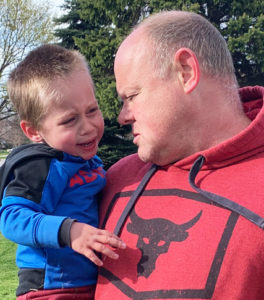
In our world today, it feels like we are constantly experiencing a changing season of transitions. Whether those transitions are big or small, a season of unexpected changes and unknowns can create some BIG feelings. Feelings like anticipation, anxiety, excitement, fear, joy, and sadness can impact our perspective of the world and how we navigate our daily routines and relationships.
As adults, we have developed the capacity to understand our emotional responses and how to verbally express our hearts, dreams, and desires. For young children, emotional regulation and self-expression is a developmental process that is learned through child-adult interactions, experiences, and supportive environments.
I am comforted by one of Fred Rogers’ messages for caregivers on emotional wellness.
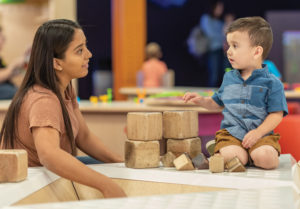
“Anything that’s human is mentionable, and anything that is mentionable can be more manageable. When we talk about our feelings, they become less overwhelming, less upsetting, and less scary. The people we trust with that important talk can help us know we’re not alone.” -Fred Rogers
Children look to their adults for guidance, love, and support. In times of stress, children may seem like they regress or “go backwards” in their emotional development when experiencing an unexpected transition such as a new home environment, a teacher missing from their classroom, a quarantine away from loved ones, or just not feeling well.
It is important to note: Regression is a normal response to coping with times of stress and managing emotions. Being patient and talking about your own feelings helps young children to understand their emotions and to feel less overwhelmed and more secure.
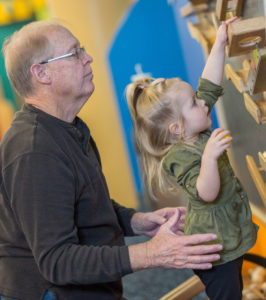
How You Can Help
Caring and Responsive Relationships
Invested, caring adults are the most important influence on a young child’s life! Your loving presence brings comfort, joy, and stress-relief to your child in all stages of their growth and development. Every time you respond to a child verbally or by actions, that child is learning their emotions and expressions matter most to you.
Create a Safe Space
Children often need a quiet, cozy space to feel comforted when experiencing BIG feelings. Try setting up a soft space in your environment with pillows, blankets, special books, photos, and the child’s favorite objects or stuffed animals. Creating a comfortable space for children to de-stress helps a child to relax and calm their bodies. Learn more on how to create a DIY “Twinkle Tunnel” here: https://youtu.be/YDEaJFqUW4A
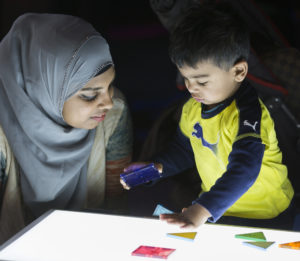
Play Together
Play is the best way to learn about feelings! When a caring adult plays with a child, that child builds critical emotional developmental skills; such as, sharing their emotions, interacting appropriately with others, and solving problems. Play also reduces stress and anxiety, and provides an opportunity for children to engage in imaginative play to practice or “act out” their feelings. Peek-a-Boo is a great way to use play to work on feelings about separation. Try covering your head with cloth or a towel and ask “Where am I?” and reply “Here I am!” For more ideas, check out this resource: https://pathways.org/watch/parents-guide-to-stages-of-peek-a-boo/
About Katie
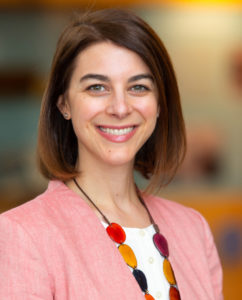
Katie Gullone serves as the new Senior Manager, Early Learning and Family Engagement at DuPage Children’s Museum. In her previous work, Katie managed early childhood grant-supported programs in partnership with Carnegie Mellon University’s CREATE Lab, Pittsburgh AEYC and the Fred Rogers Center for Early Learning and Children’s Media. Additionally, Katie serves as Adjunct Faculty for Carlow University and specializes in child development theory, play, media literacy, and STEM. She holds a Master of Education in Early Childhood Education with teaching licensure from Carlow University and a Bachelor of Arts in Interpersonal Communication from Meredith College.
“I am thrilled to be a part of the DCM community where children’s play, self-discovery, and creativity are valued and all caregivers, educators, and families are embraced. It is a joy to work in an environment that aligns with my philosophy of play and approach to working with children and families.”

